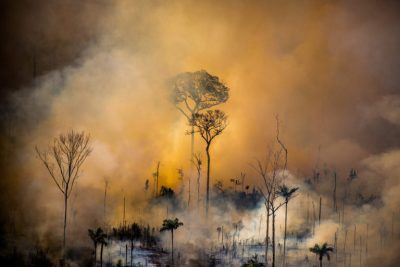Amazon Deforestation Tops 11,000 sq km in Brazil, Reaching 12-year High

Deforestation in the Brazilian Amazon topped 11,000 square kilometers for the first time since 2008 reports the Brazilian government.
According to data released today by Brazil’s national space research institute INPE, deforestation in the Brazilian Amazon for the year ending July 31, 2020 amounted to 11,088 square kilometers, an area the size of Jamaica. The loss, which represents a 9.5 percent increase over the same period last year, is nearly triple the 3,925 square kilometer target established in the 2009 National Policy on Climate Change.

The state of Pará accounted for nearly half of forest clearing in 2020 according to the data. Mata Grosso (16 percent of deforestation), Amapá (14 percent), and Rondônia (11 percent) followed. Pará, Mata Grosso, and Rondônia — states where cattle ranching and soy farming have rapidly expanded in recent decades — perennially lead the country in deforestation.


The new data are preliminary. Brazil typically releases the official data a few months into the new calendar year. For example, Brazil revised the preliminary 2019 numbers up 3.8 percent this past June.
The rise in Amazon deforestation was expected. Data from monitoring systems run by INPE and Imazon, an independent Brazilian NGO, had shown monthly deforestation pacing well ahead of last year’s rate.
Environmentalists have blamed the rising deforestation rate on the Bolsonaro administration’s efforts to roll back forest protection, reduce environmental law enforcement and penalties for illegal forest clearing, sack career scientists from federal agencies, and demonize environmental defenders as enemies of the state. In his 2018 presidential campaign, Jair Bolsonaro called for increased logging, mining, dam construction, and agricultural expansion across the Amazon.
Deforestation in the Brazilian Amazon, which accounts for more three-fifths of the forest cover in Earth’s largest rainforest, has been trending upward since bottoming out in 2012 at 4,571 square kilometers.
Scientists fear that rising deforestation and the effects of climate change could tip vast swathes of the Amazon rainforest to a drier savanna-like ecosystem. Such a transition could have dire implications for rainfall across southern South America, which includes the continent’s main agricultural region and its biggest cities. Large-scale Amazon die-off would also trigger substantial greenhouse emissions, further destabilizing global climate.
*
Note to readers: please click the share buttons above or below. Forward this article to your email lists. Crosspost on your blog site, internet forums. etc.
Featured image: Fire along the border of the Kaxarari Indigenous territory, in Lábrea, Amazonas state. Taken August 17, 2020. CREDIT: © Christian Braga / Greenpeace

